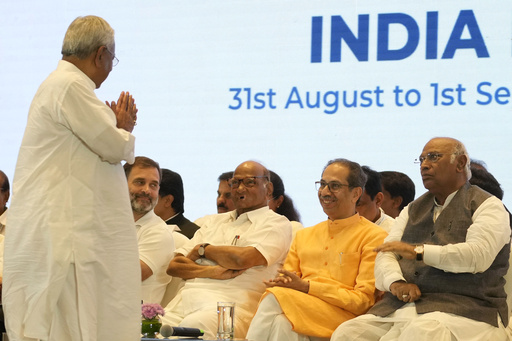NEW DELHI (AP) — Last year more than two dozen opposition parties in India came together to take on Narendra Modi, one of the country’s most popular prime ministers in generations. But the broad alliance, beset with ideological differences and personality clashes, is cracking at a crucial time, just months before the country votes in a national election.
Riven by rivalries, political defections and ideological clashes, the INDIA alliance, formed to unseat Modi and defeat his Bharatiya Janata Party’s electoral juggernaut, is in shambles, analysts say. Meanwhile, support for Modi is on the rise after he opened a Hindu temple in northern Ayodhya city last month, fulfilling his party’s long-held Hindu nationalist pledge.
Led by the Indian National Congress party that once dominated the country’s politics, the unity front includes over two dozen powerful regional parties that are direct rivals to each other in some states. Their differences have only grown sharper as the election approaches, bolstering Modi’s shot at securing a third consecutive term.
“The opposition is in disarray. They’re looking very weak and not at all cohesive,” said Arati Jerath, a political commentator.
Analysts say talks on seat-sharing within the alliance have gone cold, in part due to the Congress party’s demands of fielding its own candidates in a majority of the seats, even in states where it is weak. This triggered two of the alliance’s key partners in West Bengal and Punjab states to say they would contest seats there alone.
India has a first-past-the-post multiparty electoral system in which the candidate who receives the most votes wins. In 2019, Modi’s party received 37% of the votes, but won 303 of the 543 seats. The opposition is hoping to consolidate the splintered vote among the parties by fielding a single primary candidate in each constituency against the BJP in the elections, which are expected to take place in April and May.
Meanwhile the recent defection of Nitish Kumar, the chief minister of eastern Bihar state and one of the architects of the INDIA alliance, to Modi’s party dealt another unexpected blow.
“Modi’s party has been successful in exposing distrust within the opposition alliance. It is cannibalizing the opposition parties from within by engineering these defections and draining them from the ground,” said Gilles Verniers, a scholar of Indian politics and a senior fellow at the New Delhi-based Centre for Policy Research.
Verniers said the opposition has failed to find common ground and craft a narrative that could challenge Modi.
“From the start, the opposition alliance had to be more than just electoral arithmetic. But most parties are putting their own interests ahead and are looking to consolidate their positions in the states where they are strong. They are not ceding space to each other,” he said.
The fracturing of the opposition alliance also stems from problems that have long plagued the dynastic Congress party, which is struggling to stay relevant among voters. In the 2019 election, the party secured a paltry 52 seats in Parliament.
In contrast, Modi has presented himself as an outsider cracking down on the political elite. The 73-year-old leader has also increasingly mixed religion with politics in a formula that has resonated deeply with India’s majority Hindu population even if it undermines the country’s secular roots.
While the Congress’ main leader, Rahul Gandhi — scion of the influential Gandhi family — has drawn large crowds along two cross-India walks in recent months, poll experts question whether it would actually translate into votes.
The Congress party also recently lost in key state polls where it fought directly against the BJP. Meanwhile, an emboldened Modi told Parliament earlier this month that his BJP was aiming for 370 seats in the upcoming polls, and their National Democratic Alliance would target 400 out of the 543 seats.
The opposition acknowledges there have been setbacks but claim they also been unfairly targeted and in a manner that belies the country’s democratic principles.
Shashi Tharoor, a lawmaker from the Congress party, pointed to a spree of raids, arrests and corruption investigations against alliance leaders in some states by federal agencies that the opposition says are politically motivated.
India’s main financial investigation agency has launched probes against many key opposition leaders, all of whom are political opponents of the BJP. Meanwhile, some investigations against erstwhile opposition leaders who later switched their allegiance to the ruling party have been dropped.
“The government is not a believer in a level playing field,” said Tharoor. “There is not a single investigation, known or continuing, against anyone in the ruling party.”
Modi’s party denies using law enforcement agencies to target the opposition and says the agencies act independently.
According to Tharoor, the harassment of the opposition fits into a larger, more troubling picture for India in which its democratic and secular foundations are under threat.
“The BJP has embarked on a very serious and far-reaching project to change the very character of the Indian nation,” he said.
Political experts question why the opposition has failed to make key issues, including rising unemployment and economic discontentment, resonate with the more than 900 million voters.
Even as India’s economy expands, joblessness among its large and young workforce has posed a significant challenge for Modi’s government. This was on stark display last month, when thousands of Indians vied for construction jobs in war-hit Israel.
“They seem to lack the fire, the will to win, which the BJP have in ample quantities,” said Jerath, the political commentator. “Today, unless there is a popular uprising against the ruling party over economic distress, Modi looks well set to win a third term comfortably.”
___
Follow AP’s Asia-Pacific coverage at https://apnews.com/hub/asia-pacific



